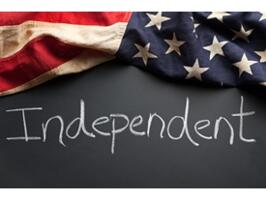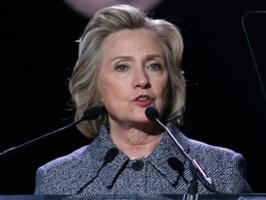No Trump, No Show for 33% of GOP Voters
Members of the establishment in both major political parties worry that supporters of Donald Trump and Bernie Sanders will not align with the party’s eventual nominee if their guy isn't chosen, but that appears to be a much more serious problem for Republicans than for Democrats.
One-in-four Likely Republican Voters (25%) say they are more likely to vote for someone else or not vote at all if Trump does not win the Republican nomination and chooses not to run as an independent, according to a new Rasmussen Reports national telephone survey. This includes 12% who are more likely to opt for another candidate and 13% who are inclined to stay at home. Another eight percent (8%) say they will more likely vote for the Democratic nominee instead.
Just 62% of Republicans say they are more likely to vote for the Republican nominee if it isn't Trump. By comparison, 80% of Democrats say they are more likely to vote for their party's nominee if it isn't Sanders and he chooses not to run as a third-party candidate. Nine percent (9%) are more likely to choose the Republican candidate, while six percent (6%) lean toward voting for someone else. Only two percent (2%) are more likely not vote at all. (To see survey question wording, click here.)
Among all voters, 42% are more likely to vote for the Democratic nominee if Trump is out of the race, while 33% would still vote Republican. Eighteen percent (18%) are more inclined to vote for someone else or stay home. If Sanders is out, 38% will more likely vote for the Republican, while the same number (38%) are leaning toward voting Democrat. Sixteen percent (16%) are more likely not to vote at all or to vote for another candidate. In both cases, seven percent (7%) remain undecided.
In early March, 36% of Republicans said they are likely to vote for Trump if he runs as a third-party presidential candidate. Twenty-nine percent (29%) of Democrats said the same of a third-party bid by Sanders.
(Want a free daily e-mail update? If it's in the news, it's in our polls). Rasmussen Reports updates are also available on Twitter or Facebook.
The survey of 1,000 Likely U.S. Voters was conducted on April 5-6, 2016 by Rasmussen Reports. The margin of sampling error is +/- 3 percentage points with a 95% level of confidence. Field work for all Rasmussen Reports surveys is conducted by Pulse Opinion Research, LLC. See methodology.
While Republican Party leaders talk increasingly of a brokered convention, just over half of GOP voters think their presidential nominee should be the candidate who arrives at the convention with the most delegates. Right now, either Trump or Senator Ted Cruz of Texas is that candidate.
Some top Republicans see House Speaker Paul Ryan as the party’s savior if they can just make him the GOP presidential nominee. But Ryan loses to both major Democratic candidates in head-to-head matchups, with roughly a quarter of Republicans looking somewhere else.
Among those crucial voters not affiliated with either of the major parties, 33% are more likely to vote for the GOP nominee if Trump is not in the race, while 28% would vote for the Democrat. Seventeen percent (17%) are more likely to opt for someone else, and eight percent (8%) are inclined not to vote at all. But a sizable 14% are not sure.
If Sanders is not on the ballot, only 21% of unaffiliated voters say they are more likely to vote for the Democratic nominee. Forty percent (40%) lean toward supporting the Republican, while 18% are more likely to choose someone else. Seven percent (7%) suspect that will stay home, but again 14% are undecided.
Current Democratic front-runner Hillary Clinton is having difficulty connecting with younger voters, a key element of her party's voting base and strong supporters of Sanders' bid. Among voters under 40, just 44% say they are more likely to vote for the Democratic candidate if Sanders is not the nominee.
Many prominent conservatives have been critical of Trump, arguing that he is not truly one of them. Fifty-eight percent (58%) of conservative voters say they are more likely to support the GOP candidate if Trump is not the nominee.
Our latest Trump Change survey shows that the billionaire’s reverse momentum continues following his second-place showing in last week’s Wisconsin primary. Rasmussen Reports is currently asking voters about the likelihood that either of his remaining Republican rivals, Cruz and Ohio Governor John Kasich, will win the party’s nomination. We’ll release those findings at 10:30 a.m. Eastern today.
All three remaining Republican candidates refused to say recently whether they would support the party’s eventual presidential nominee if they didn’t win. But most Republicans don’t care if the failed candidates support the nominee or not.
Our most recent Hillary Meter shows that Democrats are more certain than ever that Clinton will be their party’s presidential nominee this November.
The process to choose the Democratic nominee includes the use of superdelegates, individuals selected by the party who can support any candidate at the party's convention regardless of who wins their state's popular vote. Sander's supporters argue that the superdelegate system favors Clinton, and just over half of Democrats don't approve of it.
Additional information from this survey and a full demographic breakdown are available to Platinum Members only.
Please sign up for the Rasmussen Reports daily e-mail update (it's free) or follow us on Twitter or Facebook. Let us keep you up to date with the latest public opinion news.
The survey of 1,000 Likely U.S. Voters was conducted on April 5-6, 2016 by Rasmussen Reports. The margin of sampling error is +/- 3 percentage points with a 95% level of confidence. Field work for all Rasmussen Reports surveys is conducted by Pulse Opinion Research, LLC. See methodology.
Rasmussen Reports is a media company specializing in the collection, publication and distribution of public opinion information.
We conduct public opinion polls on a variety of topics to inform our audience on events in the news and other topics of interest. To ensure editorial control and independence, we pay for the polls ourselves and generate revenue through the sale of subscriptions, sponsorships, and advertising. Nightly polling on politics, business and lifestyle topics provides the content to update the Rasmussen Reports web site many times each day. If it's in the news, it's in our polls. Additionally, the data drives a daily update newsletter and various media outlets across the country.
Some information, including the Rasmussen Reports daily Presidential Tracking Poll and commentaries are available for free to the general public. Subscriptions are available for $4.95 a month or 34.95 a year that provide subscribers with exclusive access to more than 20 stories per week on upcoming elections, consumer confidence, and issues that affect us all. For those who are really into the numbers, Platinum Members can review demographic crosstabs and a full history of our data.
To learn more about our methodology, click here.





